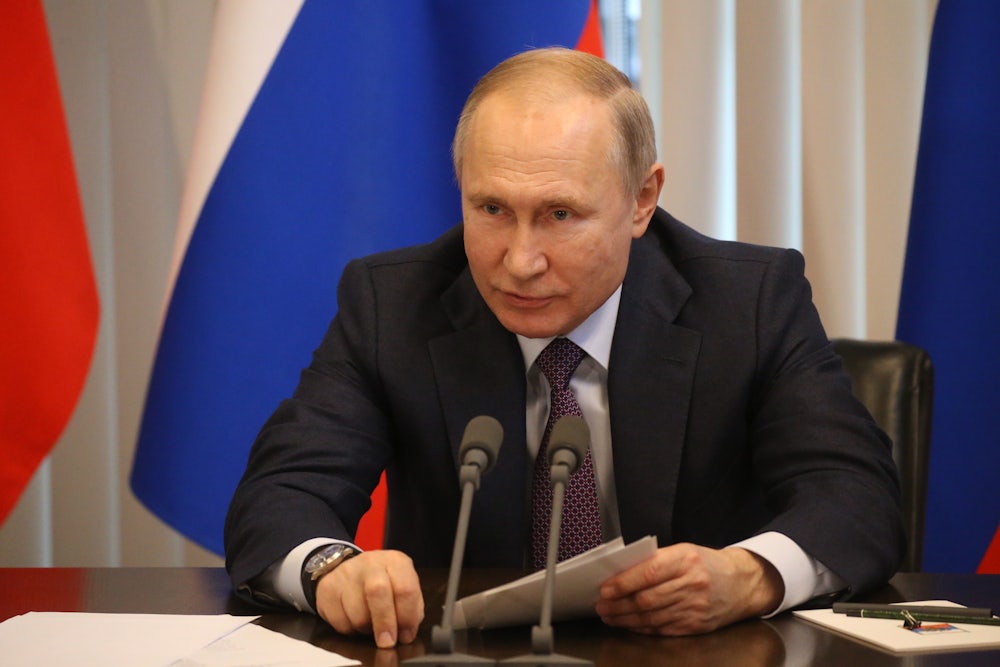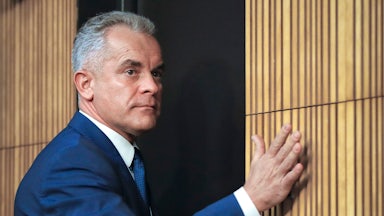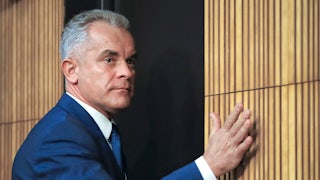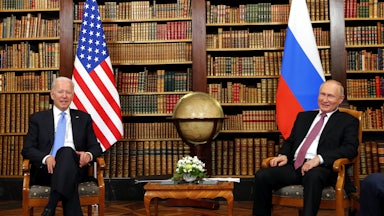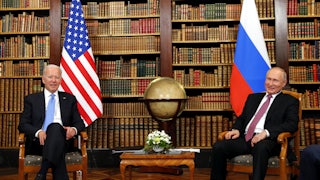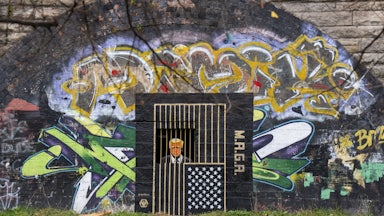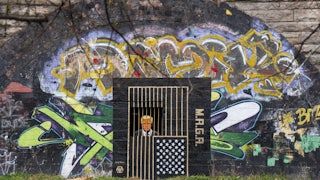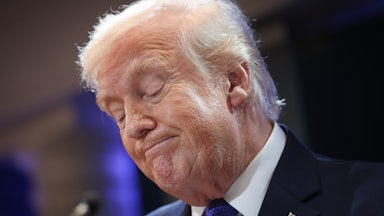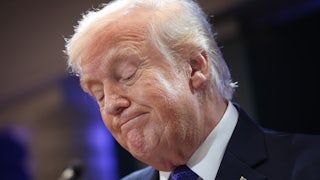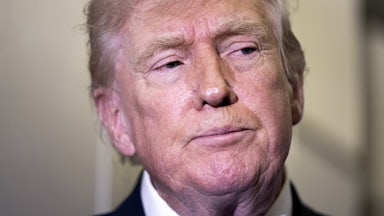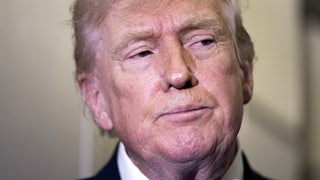For the past few months, much of the handwringing about Russia massing troops on Ukraine’s border has been centered on the extent to which the West is responsible for the latest crisis. Much of that supposed responsibility focuses on NATO expansion, the question of Ukraine’s membership in the military alliance, and the persistent claim from critics that, without Ukraine gravitating toward NATO’s embrace, Russia would have little reason to launch the greatest war Europe has seen in nearly a century.
Little matter that NATO expansion has been an unmitigated good, not only stabilizing the European continent but keeping Russia’s broader western flank more secure than at any point in living memory. Moreover, the question of Ukraine’s NATO membership has always been a canard, with Russian President Vladimir Putin’s designs on the country going far beyond a simple question of military alliances. As King’s College professor Sam Greene noted over the weekend, the entire question of Ukraine’s relationship with NATO is a “red herring.” In reality, Putin wants to steer the entirety of Ukraine’s fate, from its military to its economy to everything in between. Which is why, if and when Russian troops begin blasting further through Ukraine, the sole responsibility for the resultant bloodshed will lie with the revanchist dictatorship in the Kremlin, seeking to claw back its former colonial holdings, and not with the West.
There’s a caveat, however. While the idea that NATO expansion has driven the latest crisis is a falsehood, the West isn’t fully without blame. But the responsibility doesn’t lie in specific Ukrainian security arrangements, or in questions of weapons shipments or arms negotiations with Kyiv. Rather, the responsibility lies in the West itself—and specifically how the broader West, from the United States to the U.K. to the European Union, has spent decades tossing open its doors to the geysers of illicit, oligarchic wealth that has spewed from the post-Soviet space, bleeding the region and leading directly to the conflict we’re now facing.
By welcoming these towering tsunamis of ill-gotten gains, these Western countries not only allowed the corrupt claques ruling the region to offshore much of their wealth, whisking it out of their country into safe Western harbors, but they accelerated the kind of wealth inequality, destabilization, and nationalism now rocking the region from Azerbaijan to Kazakhstan to Belarus. In Russia, the results have been clear, and they have been malodorous: Instead of the democratic nation that post-Soviet reformers dreamed of in the early 1990s, a kleptocratic oligarchy has burrowed into the Kremlin and returned to dreams of empire as a way to remain in power, the better to continue pillaging the Russian populace and stashing its illicit wealth across the West.
At this point, it’s relatively well known that the greatest centers of offshoring are no longer places like Panama or the Cook Islands but are instead the major centers of global finance, from Washington to London to Berlin. Even nominally clean countries like Canada and Australia have kept pace, offering everything from anonymous shells to anonymous real estate purchases to anonymous luxury and private investments to whoever came calling, laundering the proceeds in the process. Along the way, Western lawyers, accountants, real estate agents, and consultants grew fat on the inflow of oligarchic wealth. And especially in the post-Soviet space, dreams of democratization crashed on the bloody shoals of entrenched regimes that have used that stolen wealth—and the myriad Western financial secrecy tools freely on offer—to bankroll whatever they needed to remain in power.
Nor was it just the financial secrecy tools—the shell companies in Delaware, the trusts in South Dakota, the foundations in New Hampshire—that these despotic figures could avail themselves of. Western universities, especially in the U.S. and the U.K., opened up to the deep-pocketed oligarchs (and their children) looking to transform themselves into donors and philanthropists. Law and lobbying firms tossed open their doors to regime after regime, spinning their messages and defending their claims in court—all while simultaneously crafting the same offshoring policies these regimes needed to have at hand to continue their dirty dealings. And politicians, including those like former German Chancellor Gerhard Schröder and former British Prime Minister Tony Blair, hopped from their political perches directly into the pockets of these rising autocrats, becoming the best lobbyists that blood money could buy.
The examples of all of these related Western offshoring services accelerating destabilization, nationalism, and rising despotism could fill volumes. Scratch the surface of any national security crisis, and you’ll find illicit finance—and Western responsibility therein—just below the surface.
Ukraine and Russia are no different. In Cheyenne, Wyoming, a small home hosts the shell companies used by a former Ukrainian prime minister who looted hundreds of millions from Ukrainian citizens. In Washington, the legacy of American lobbyist Paul Manafort—the man who launched former Ukrainian strongman Viktor Yanukovych to power, resulting in Ukraine’s 2014 revolution and everything that’s followed since—still reverberates. In England, the renowned University of Cambridge still describes sanctioned Ukrainian oligarch Dmitro Firtash in glowing terms—primarily because Firtash, one of Putin’s key allies in Ukraine, donated millions of pounds to the university. And across the U.K., according to a recent report from Chatham House, billions of pounds connected to post-Soviet dictators, their families, or their close allies saturate the country—and that’s just the wealth we know about.
Now, finally, we’re seeing the results. A regime in Moscow, reliant on a pliant West for all of its financial secrecy needs, stands emboldened. A populace in Ukraine, which successfully tossed off its own budding kleptocratic thug in 2014, now stands prone. And Europe suddenly faces the greatest devastation it’s seen since the days of the Yugoslav Wars, and potentially since the days of the Second World War.
There’s still time to avert disaster. And if there’s a reversal of fortune, it will come with officials in Washington and London and Brussels finally implementing the kinds of counter-kleptocracy policies that are decades overdue. Indeed, there are signs that may actually be happening. The Biden administration placed counter-kleptocracy strategy front and center last year, and British partners are finally making noise about getting serious about ending the U.K.’s role as one of the world’s greatest financial malefactors.
These reforms can no longer wait. The kleptocratic chicken is coming home to roost, in the form of Russian boots potentially marching on Kyiv and launching the kind of bloodshed Europe thought would remain in a dark, past chapter of its continental history. If that does happen, the West will be responsible—not because it erected alliances in the hopes of securing a free and democratic Europe, but because it erected the financial safe harbor that despotic regimes, corrupt oligarchs, and thieving dictatorships have used to secure their ill-gotten gains. These actors see Moscow as a model, and they are eager to follow suit.
